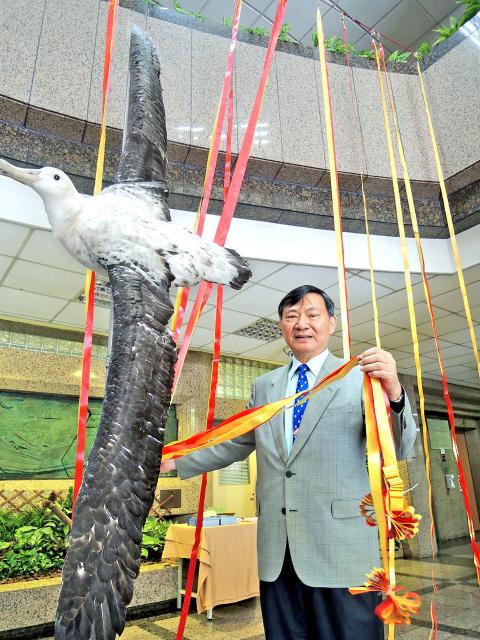The Fisheries Agency yesterday unveiled an updated national action plan to reduce the incidental catch of seabirds in the nation’s longline tuna fisheries to protect albatrosses and petrels, among others.
The agency said that, as one of the major tuna longline fisheries countries in the world, Taiwan has more than 1,000 longline vessels operating across three oceans that unintentionally affect seabird populations.
To reduce the bycatch of seabirds during fishing, the agency said that it developed the first edition of its National Plan of Action on Seabirds in 2006 in accordance with that adopted by the UN’s Food and Agriculture Organization.

Photo: Hsieh Wen-hua, Taipei Times
The agency updated its plan this year.
Fisheries Agency Director-General James Sha (沙志一) said that the agency has instructed fishing vessels to install two “bird-scaring” lines since 2006, reducing seabird bycatch by 50 percent.
He said that the new edition of the action plan would also require vessels to select at least two of the three other chosen methods to further reduce incidents of seabird bycatch.
Apart from installation of bird-scaring lines, fishing vessels might install weighted branch lines or choose to set up baits at night.
Nanhua University assistant professor Yeh Yu-min (葉裕民) said that the long-distance fishing fleet first extend a main fishing line, and the baits, such as pacific saury, are hung on the hooks of branch lines under the main line.
She said that albatrosses and other seabirds quickly eat those baits before the branch lines are submerged, adding that the hooks on the branches could result in the unintended catch of these birds. Unable to get themselves off the hooks, the birds drown.
“The bird-scaring lines will cause the birds to fly away from the fishing boats,” she said. “The branch lines will go under the sea faster if they are attached with lead blocks.”
Setting baits at night would prevent seabirds from approaching because they cannot see the baits, the agency said.

Nipah virus infection is to be officially listed as a category 5 notifiable infectious disease in Taiwan in March, while clinical treatment guidelines are being formulated, the Centers for Disease Control (CDC) said yesterday. With Nipah infections being reported in other countries and considering its relatively high fatality rate, the centers on Jan. 16 announced that it would be listed as a notifiable infectious disease to bolster the nation’s systematic early warning system and increase public awareness, the CDC said. Bangladesh reported four fatal cases last year in separate districts, with three linked to raw date palm sap consumption, CDC Epidemic Intelligence

The manufacture of the remaining 28 M1A2T Abrams tanks Taiwan purchased from the US has recently been completed, and they are expected to be delivered within the next one to two months, a source said yesterday. The Ministry of National Defense is arranging cargo ships to transport the tanks to Taiwan as soon as possible, said the source, who is familiar with the matter. The estimated arrival time ranges from late this month to early next month, the source said. The 28 Abrams tanks make up the third and final batch of a total of 108 tanks, valued at about NT$40.5 billion

Two Taiwanese prosecutors were questioned by Chinese security personnel at their hotel during a trip to China’s Henan Province this month, the Mainland Affairs Council (MAC) said yesterday. The officers had personal information on the prosecutors, including “when they were assigned to their posts, their work locations and job titles,” MAC Deputy Minister and spokesman Liang Wen-chieh (梁文傑) said. On top of asking about their agencies and positions, the officers also questioned the prosecutors about the Cross-Strait Joint Crime-Fighting and Judicial Mutual Assistance Agreement, a pact that serves as the framework for Taiwan-China cooperation on combating crime and providing judicial assistance, Liang

A group from the Taiwanese Designers in Australia association yesterday represented Taiwan at the Midsumma Pride March in Melbourne. The march, held in the St. Kilda suburb, is the city’s largest LGBTQIA+ parade and the flagship event of the annual Midsumma Festival. It attracted more than 45,000 spectators who supported the 400 groups and 10,000 marchers that participated this year, the association said. Taiwanese Designers said they organized a team to march for Taiwan this year, joining politicians, government agencies, professionals and community organizations in showing support for LGBTQIA+ people and diverse communities. As the first country in Asia to legalize same-sex